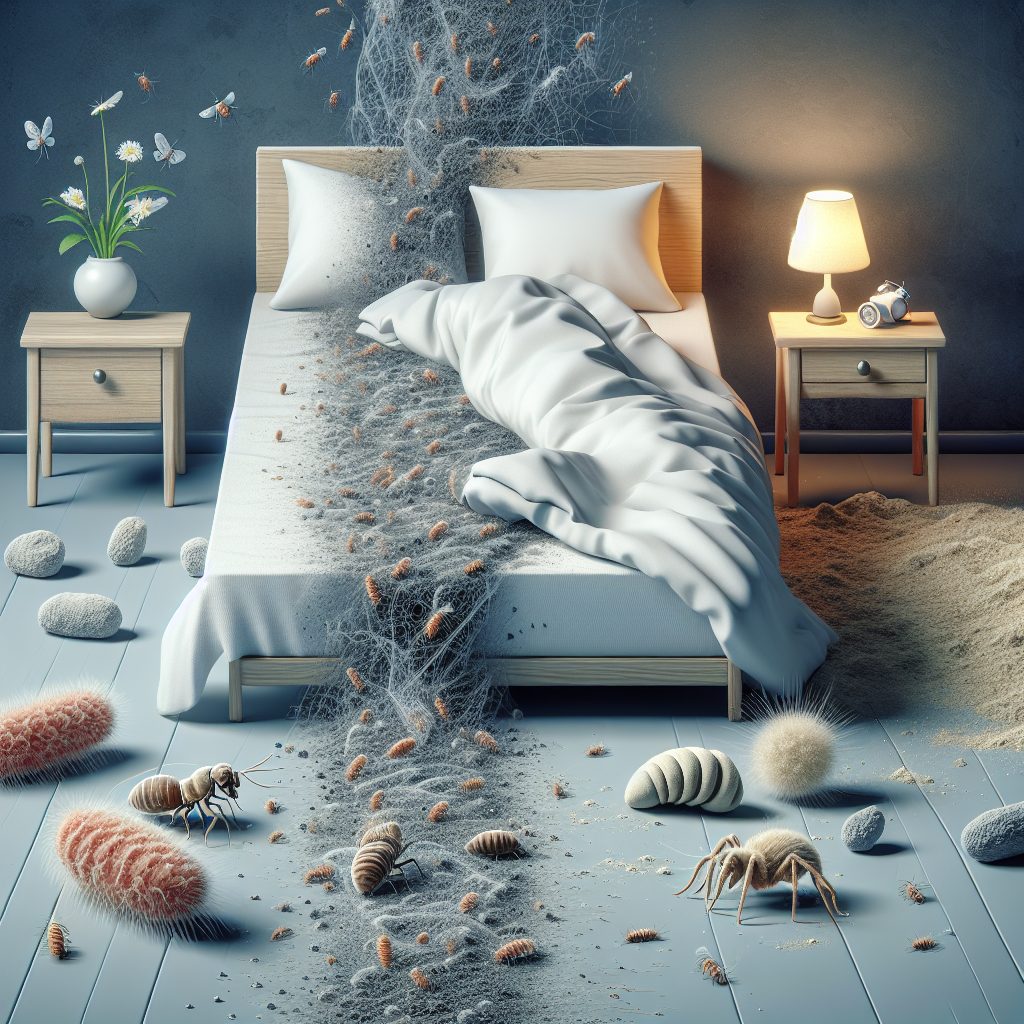
Allergens and how they impact sleep quality is an often overlooked, yet important factor within our lives. Allergens are outside particles or substances, like pollen, animal dander, dust, smoke, and certain foods that can enter the body and trigger an allergic reaction. Depending on the severity of the allergy, sleep quality can be either mildly or severely impacted. Common symptoms from allergies that can lead to poor sleep quality are itching, sneezing, coughing, watery eyes and a runny nose. These can lead to increased respiration rate, chest congestion and a stuffy nose. Depending on the time of the year, location, and lifestyle, allergies can significantly impact sleep quality.
The effects of allergens on sleep can oftentimes be difficult to treat, especially when the allergens themselves cannot be avoided. Though there are certain measures people can take in order to reduce the amount of allergens within a space. Reducing clutter and cleaning surfaces with a damp cloth or air purifier can help limit allergens and reduce symptoms. Furthermore, speaking to a physician about the right medication as well as therapeutic interventions can help reduce the impact of allergens on sleep quality and allow for a more comfortable nights rest. With the right combination of approaches, it is possible to manage the effects of allergies on sleep.
Key Takeaways
1. People with allergies are more likely to experience poorer sleep quality than those without.
2. Exposure to certain allergens, such as pollen and mold spores, is likely to significantly worsen sleep quality.
3. Reducing allergen exposure is the most effective way to reduce disrupted sleep and gain better quality sleep.
4. Instituting a good sleep hygiene routine, such as a regular bedtime, can help promote a better sleep quality in allergy sufferers.
5. Allergy medications can provide a stopgap in cases of severe allergic reactions, but should not be relied upon as a long-term solution to maintain good sleep quality.
How Can Allergens Impact Sleep Quality?
Allergies can have strong physical effects that, in turn, can impact the quality of sleep a person is able to achieve. Beyond the discomfort that comes from a runny nose or itchy eyes, allergies can disrupt sleep patterns and lead to increased tiredness, stress, and anxiety. It is important to be aware of how allergies can certain allergens can affect sleep, and how to reduce the impact they have on sleep.
Environmental Allergens and Sleep
Environmental allergens such as pollen, dust, and mold spores can strongly influence the quality of sleep. With pollen season, for example, many people find it hard to fall asleep, or will have an overall decrease in the quality of sleep. Allergy-related congestion can cause snoring and other breathing complications that interrupt a person’s sleep.
Food Allergens and Sleep
Some food allergies can also have a direct influence on sleep. An allergic reaction to foods, particularly common triggers like milk, eggs, and nuts, can contribute to inflammation of the airways, increased mucus production, and respiratory complications. All of these can impact sleep patterns, preventing a person from achieving a full and restful night of sleep.
How To Improve Sleep Quality Despite Allergies
1. Avoid Allergy Triggers
When a person is aware of what causes their allergies, it is best to avoid such triggering items. For pollen and dust allergens, this may mean keeping windows closed and using air filtration systems during the peak weeks of the season. For food allergies, it is important to be aware of what foods are causing the reaction.
2. Track Allergy Symptoms
Tracking allergy symptoms and noting what changes when the symptoms worsen or improve can help a person better understand which allergens are impacting their sleep. This can help identify the need for medication to help with more severe allergies.
3. Use Medication
Taking antihistamines and decongestants can help reduce the symptoms of allergies and improve sleep. As always, it is important to talk to a healthcare professional before taking any form of medication.
4. Keep Bedroom Clean and Allergen-Free
Keeping the bedroom as clean as possible, and free of allergy triggers, can go a long way in improving the quality of one’s sleep. Regularly washing bedding and wiping down furniture ensures that allergens don’t have a chance to accumulate.
5. Consider Allergy Shots
Allergy shots are a form of immunotherapy that involves injecting a person with small but gradually increasing doses of allergens to decrease the body’s sensitivity. Several studies have shown that, when used properly, allergy shots can help minimize allergic reactions and can improve the quality of sleep.
What causal relationship exists between allergens and sleep quality?
Research studies have shown that allergens are a significant contributor to sleep deficits. Exposure to allergens can lead to difficulty in breathing, reduced airflow to the lungs, chest tightness, and coughing which can lead to restless sleep, frequent awakenings, fatigue, and poor quality sleep. Similarly, increased levels of inflammation due to allergies can disrupt the body’s natural sleep cycle.
What should be done if I am exposed to allergens during sleep?
If you are exposed to allergens during sleep, the best advice is to immediately go outside and take a few deep breaths. This will help clear the allergens from your airways and reduce the chances of further allergic reactions. Additionally, you should take some antihistamines prior to going to bed. This will help reduce the symptoms of allergies and help you to sleep better.
What strategies can be used to reduce exposure to allergens during sleep?
One of the best ways to reduce exposure to allergens during sleep is to invest in hypoallergenic bedding and mattresses. It is also important to keep your bedroom clean and vacuum regularly. You should also make sure to keep windows and doors closed during pollen season, or when there are high levels of mold and dust in the atmosphere. This will reduce the amount of allergens entering your bedroom.
Are there any other methods of improving sleep quality?
Yes. It is important to make sure to stick to a regular sleep schedule by going to bed and waking up around the same time every day. This will help to set a healthy and consistent sleep-wake cycle. Additionally, establishing a relaxing nighttime routine that does not involve screens or bright lights can also help promote healthy sleep. Regular exercise, limiting alcohol consumption, and avoiding caffeine close to bedtime may also help.
What natural remedies may help reduce allergy symptoms?
There are several natural remedies that may help reduce allergy symptoms. Consuming foods that are rich in antioxidants, such as dark leafy greens, peppers, and berries, can help reduce inflammation and reduce the severity of allergies. Other options include local honey, chamomile tea, steam inhalation, and nasal irrigation. It is important to consult with your doctor before trying any new remedies.
How does diet play a role in improving sleep quality?
A healthy diet can play an important role in promoting sleep quality. Sufficient intake of nutrients such as magnesium, Vitamin D, and tryptophan can help to support natural sleep cycles. Eating a balanced diet that contains plenty of fruits and vegetables, whole grains, nuts and seeds, and healthy fats can also help to improve sleep quality. Additionally, avoiding heavy and processed meals before bedtime can also help.
What lifestyle changes can improve sleep quality?
Implementing certain lifestyle changes can help to improve sleep quality. Avoiding substantial caffeine consumption, avoiding screens close to bedtime, establishing a regular sleep schedule, and avoiding late night snacks can all help to improve sleep quality. Additionally, it is important to limit alcohol consumption and avoid strenuous exercise close to bedtime.
Is sleep apnea related to allergens?
Yes, in some cases sleep apnea can be caused by allergens. Allergens can cause inflammation in the airways, resulting in reduced airflow to the lungs. This can lead to increased levels of carbon dioxide in the blood, and interfere with the body’s normal respiration cycle. If left untreated, it can lead to severe respiratory issues such as sleep apnea.
Is it normal to struggle with sleeping during allergies?
Yes, it is normal to struggle with sleeping during allergy season. Allergens can cause inflammation and difficulty breathing, which can make it difficult to maintain comfortable and undisturbed sleep. Additionally, many people also find that their allergies cause them to experience bouts of fatigue during the day, further impacting their ability to sleep at night.
Can allergies cause long-term sleep problems?
Yes, allergies can cause long-term sleep problems if left untreated. As allergies cause inflammation and reduce airflow to the lungs, the body becomes unable to properly regulate natural sleep cycles. This can lead to chronic sleep deprivation and exhaustion, as well as an increased risk of other issues such as cardiovascular and metabolic diseases.
Can antihistamines improve sleep quality?
Yes, antihistamines can help to improve sleep quality in people with allergies. Antihistamines are designed to reduce the symptoms of allergies, such as inflammation in the airways, which can lead to improved sleep. It is important to consult with your doctor before taking any antihistamines as some can cause drowsiness.
Final Thoughts
Allergens can have a severe impact on our sleep quality, leading to poorer quality sleep, daytime fatigue, and an increased risk of other health issues. Therefore, it is important to take steps to reduce exposure to allergens and manage allergies, such as investing in hypoallergenic bedding and mattresses, avoiding screens before bed, and maintaining a healthy diet and lifestyle. Additionally, consulting with your doctor about the use of antihistamines can also help to improve sleep quality.
With the right strategies and lifestyle modifications, sleep quality can be improved even during allergy season. Taking steps to reduce allergens in the bedroom and using natural remedies can be beneficial in promoting healthier sleep habits and reducing the risk of long-term sleep problems.



